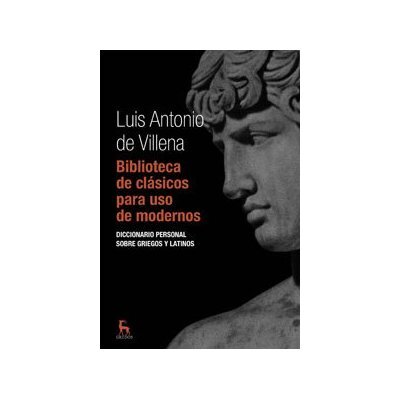Luis antonio de villena
Interview with luis antonio de villena (07/02/2016)
The first trend will be that of the continuators of the novísima aesthetics, which already in the 80s begins its decline, and that especially affects those who most defend decadentism and culturalism. They will be the so-called posnovísimos of Luis Antonio de Villena. His themes will revolve around lost youth, the body, homosexuality, the Mediterranean as a space of adventure and pleasure, the jubilant or elegiac tone for his poems, and the masters Cavafis, Cernuda, Gil-Albert and Brines.
A possible influence is hinted at by Villena when he mentions an interview, dated in Turin in 1951, with Montale: «Having felt since I was born a total disharmony with the reality that surrounded me… Perhaps I am in love with all realities out of disgust. I detest normality. And I detest those who have erected the ominous monument to that Normality, which leads us all to grayness and death.» [1]
In seventeenth-century French, libertin came to mean one who did not submit to the beliefs or practices of religion. And, as a consequence, the one who sought a different life, disarranged, with respect to the morality in use.[1] [1] In the French of the 17th century, libertin became the one who did not submit to the beliefs or practices of religion.
Monedero and luis antonio de villena: face to face
The first tendency will be that of the continuators of the novísima aesthetics, which already in the 80’s began its decline, and which especially affects those who most defend decadentism and culturalism. They will be the so-called posnovísimos of Luis Antonio de Villena. His themes will revolve around lost youth, the body, homosexuality, the Mediterranean as a space of adventure and pleasure, the jubilant or elegiac tone for his poems, and the masters Cavafis, Cernuda, Gil-Albert and Brines.
A possible influence is hinted at by Villena when he mentions an interview, dated in Turin in 1951, with Montale: «Having felt since I was born a total disharmony with the reality that surrounded me… Perhaps I am in love with all realities out of disgust. I detest normality. And I detest those who have erected the ominous monument to that Normality, which leads us all to grayness and death.» [1]
In seventeenth-century French, libertin came to mean one who did not submit to the beliefs or practices of religion. And, as a consequence, the one who sought a different life, disarranged, with respect to the morality in use.[1] [1] In the French of the 17th century, libertin became the one who did not submit to the beliefs or practices of religion.
Luis antonio de villena’s reading of his poem ‘escapa’.
The first tendency will be that of the continuators of the novísima aesthetics, which already in the 80’s began its decline, and which especially affects those who most defend decadentism and culturalism. They will be the so-called posnovísimos of Luis Antonio de Villena. His themes will revolve around lost youth, the body, homosexuality, the Mediterranean as a space of adventure and pleasure, the jubilant or elegiac tone for his poems, and the masters Cavafis, Cernuda, Gil-Albert and Brines.
A possible influence is hinted at by Villena when he mentions an interview, dated in Turin in 1951, with Montale: «Having felt since I was born a total disharmony with the reality that surrounded me… Perhaps I am in love with all realities out of disgust. I detest normality. And I detest those who have erected the ominous monument to that Normality, which leads us all to grayness and death.» [1]
In seventeenth-century French, libertin came to mean one who did not submit to the beliefs or practices of religion. And, as a consequence, the one who sought a different life, disarranged, with respect to the morality in use.[1] [1] In the French of the 17th century, libertin became the one who did not submit to the beliefs or practices of religion.
Word – luis antonio de villena – iii lgbtiq film festival
The first tendency will be that of the continuators of the novísima aesthetics, which already in the 80’s began its decline, and which especially affects those who most defend decadentism and culturalism. They will be the so-called posnovísimos of Luis Antonio de Villena. His themes will revolve around lost youth, the body, homosexuality, the Mediterranean as a space of adventure and pleasure, the jubilant or elegiac tone for his poems, and the masters Cavafis, Cernuda, Gil-Albert and Brines.
A possible influence is hinted at by Villena when he mentions an interview, dated in Turin in 1951, with Montale: «Having felt since I was born a total disharmony with the reality that surrounded me… Perhaps I am in love with all realities out of disgust. I detest normality. And I detest those who have erected the ominous monument to that Normality, which leads us all to grayness and death.» [1]
In 17th century French, libertin came to mean one who did not submit to the beliefs or practices of religion. And, as a consequence, the one who sought a different life, disarranged, with respect to the morality in use.[1] [1] In the French of the 17th century, libertin became the one who did not submit to the beliefs or practices of religion.










Más historias
Mejores arquitectos en Palma de Mallorca
La importancia de un interiorista en la transformación de espacios modernos
El baile: Más que coreografías, una forma de vivir